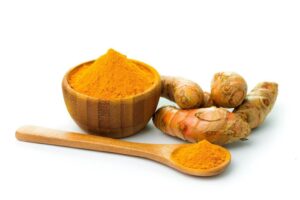8 Health Benefits of Turmeric
 Turmeric, also known as Curcuma longa, is an ancient spice that has remained popular in India and Asia since 2,000 BC. The spice belongs to the ginger family and is a prized component of the culinary traditions of these cultures. Turmeric imparts a vibrant yellowish hue to curry dishes, and the spice is used as a natural dyeing agent for cloth.
Turmeric, also known as Curcuma longa, is an ancient spice that has remained popular in India and Asia since 2,000 BC. The spice belongs to the ginger family and is a prized component of the culinary traditions of these cultures. Turmeric imparts a vibrant yellowish hue to curry dishes, and the spice is used as a natural dyeing agent for cloth.
Curcuminoids are the main phytochemicals that give turmeric its most impressive and wide-ranging health benefits. Amazingly, over 9,000 medical and clinical research studies have evaluated turmeric and curcumin and yielded a wealth of positive information.
There are three main phytochemicals in the curcuminoid family that are responsible for turmeric’s health benefits: diferuloylmethane (or curcumin, the primary curcuminoid responsible for turmeric’s vibrant yellowish color), demethoxycurcumin, and bisdemethoxycurcumin. In addition to these three chemicals, turmerone is a potent volatile oil found in the root.
Research has shown that these curcuminoids communicate with 160 mechanisms and pathways in the body to support a wide range of processes, including brain health, cardiovascular health, tissue health, and more.
8 Health Benefits
Turmeric provides an abundance of antioxidants capable of supporting cellular health, but what does that mean for you? Here are some of the most well-researched benefits of turmeric.
- Promotes Balanced Mood
- Helps Wounds Heal
- Eases Aches and Discomfort
- Encourages Balanced Blood Sugar
- Soothes Irritated Tissue
- Loosens Stiff Joints
- Encourages Normal Lipid Levels
- Supports the Stomach Lining
Promotes Balanced Mood
A randomized, double-blind, placebo-controlled study published in the Journal of Affective Disordersreported noticeable and promising results with turmeric for supporting a balanced mood. Two groups were studied. The first group received curcumin daily, while the other received placebo. After eight weeks, the mood and anxiety score tests completed by all of the participants showed significant symptom improvements compared to placebo. Could turmeric be a potential new option for stabilizing mood?
Helps Wounds Heal
Cut your finger? A study in the Sept 2014 issue of Life Sciences found that the curcumin in turmeric offers beneficial properties that appear to accelerate the wound healing process by soothing irritation and oxidation. As more research evaluates turmeric’s ability to support the body’s natural healing abilities, the breadth of applications could be enormous.
An exciting study in the October 2006 issue of Molecular and Cellular Biochemistry demonstrated the efficacy of a topical turmeric application for wounds in rats. The results showed that turmeric supported collagen synthesis rates, improved wound contraction, and increased tissue strength and cell proliferation around the wound. Turmeric also showed antioxidant properties that helped the healing process.
Eases Aches and Discomfort
An impressive study completed and published in the March 2014 issue of the Journal of Clinical Interventions in Aging examined the effect of turmeric on knee discomfort. Results showed that turmeric experienced relief on par with more conventional options. The turmeric group, however, seemed to enjoy more relief from joint stiffness. Those taking turmeric reported significantly fewer side effects than those following mainstream-oriented action plans. A double-blind, placebo-controlled study in the December 2011 issue of Surgical Endoscopy looked at turmeric supplementation on postoperative discomfort and fatigue. Patients taking turmeric experienced significantly less discomfort compared to placebo.
Encourages Balanced Blood Sugar
A novel investigative study published in the Nov 2014 issue of the Journal of Endocrinology looked at the effects of curcumin on insulin-producing cells within the pancreas called Beta cells (or B-cells) and Islet cells, in relation to imbalanced blood sugar. Researchers addressed B-cell lines and human Islet cells with preparations of turmeric and observed positive benefits.
Soothes Irritated Tissue
Turmeric is valuable in helping soothe excess irritation. The swelling response is a healthy and natural mechanism the body uses to usher soothing compounds during times of crises or repair. It’s believed that most people in today’s toxic, stress-laden environment are under constant pressure and the tissue in their body is irritated, red, and swollen as a result. A review published in the 2007 issue of Advances of Experimental Medicine noted the soothing effect of turmeric is likely exerted through its ability to inhibit enzymes that irritate tissue.
Loosens Stiff Joints
A randomized, pilot clinical study published in the November 2012 issue of Phytotherapy Research set out to determine the effectiveness of turmeric for active joint discomfort. One group received the standard-of-care medication while the other received turmeric. Patients were given symptom score sheets to assess results. Turmeric outperformed the other option on all levels and was relatively free of adverse side effects.
Encourages Normal Lipid Levels
Turmeric’s ability to encourage normal lipid profiles has been hypothesized and studied since the 1990s with varying levels of benefits. Some studies show an impressive reduction in lipid profiles for turmeric-supplemented groups. One randomized, single-blind clinical study published in the November 2011 issue of Phytotherapy Research investigated turmeric’s effect on lipid levels. Group participants were given either curcumin from turmeric in small or large servings; a control group was given vitamin E only. After just seven days, the results proved statistically significant. Small servings of turmeric produced the most favorable and balancing effects on lipid profiles.
The results of a seven-day trial showed the curcumin-supplemented participants had better lipid profile numbers. Most importantly, these studies show that turmeric is consistently safe and has very low risk of side effect.
Supports the Stomach Lining
India has long used turmeric in curry dishes as a taste and color enhancer. One reason for its longstanding popularity is because of its soothing properties on digestion. Researchers tested the protective effects of turmeric on the lining of the stomach against acidic preparations used to induce stomach ulcers. A preparation containing turmeric essential oils was administered before the ethanol and it was observed that turmeric protected the cells in the stomach and damage was reduced. In addition, turmeric also appears to offer some impressive protection for stomach ailments.
Source: https://www.globalhealingcenter.com/natural-health/8-impressive-health-benefits-turmeric/
